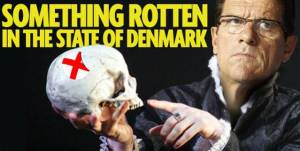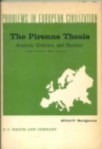 There is something rotten in the state of historical Jesus studies. Ideology has long trumped inconvenient questioning. Postmodernist flim-flam has recently trumped any hope of sound methodology. Some on that side of New Testament studies have curiously accused me of being “a fact fundamentalist” or an antiquated positivist or one who has unrealistic demands for certainty. So before I justify my claim that HJ studies have fallen hostage to ideology and methodological nonsense, let me lay all my cards out on the table and tell you what history means to me.
There is something rotten in the state of historical Jesus studies. Ideology has long trumped inconvenient questioning. Postmodernist flim-flam has recently trumped any hope of sound methodology. Some on that side of New Testament studies have curiously accused me of being “a fact fundamentalist” or an antiquated positivist or one who has unrealistic demands for certainty. So before I justify my claim that HJ studies have fallen hostage to ideology and methodological nonsense, let me lay all my cards out on the table and tell you what history means to me.
History for me has never been “about facts and dates”. It has never been “one darned thing after another.” That’s a chronicle or an archival record. Not history. In hindsight I have come to appreciate so much my senior high school years as a history student when I was taught by two pioneers in the way history was to be taught throughout Australian secondary schools, J.H. Allsopp and H.R. Cowie.
 The first thing we were taught was that history was an enquiry. It was a debate. It was all about exploring questions. We began our studies with the French Revolution and we were confronted with questions: Why did it happen in France? Why then? And instead of being given answers we were given competing explanations. We were forced to study up on the facts in order to try to answer these questions. Inevitably we soon discovered that the importance of certain facts varied according to the different points of view of the authors. One of the questions we were asked to test at our senior high school level of competence was historian Toynbee’s thesis that all history followed a pattern of “challenge and response”.
The first thing we were taught was that history was an enquiry. It was a debate. It was all about exploring questions. We began our studies with the French Revolution and we were confronted with questions: Why did it happen in France? Why then? And instead of being given answers we were given competing explanations. We were forced to study up on the facts in order to try to answer these questions. Inevitably we soon discovered that the importance of certain facts varied according to the different points of view of the authors. One of the questions we were asked to test at our senior high school level of competence was historian Toynbee’s thesis that all history followed a pattern of “challenge and response”.
 Then I took up history at university. We had been well prepared. First topic, the rise of feudalism. First book to read: The Pirenne thesis; analysis, criticism, and revision. We weren’t “taught” what led to the rise of feudalism in Europe. We were challenged and guided to explore the possible reasons, the competing explanations, and to show competence in the way we pursued historical questions.
Then I took up history at university. We had been well prepared. First topic, the rise of feudalism. First book to read: The Pirenne thesis; analysis, criticism, and revision. We weren’t “taught” what led to the rise of feudalism in Europe. We were challenged and guided to explore the possible reasons, the competing explanations, and to show competence in the way we pursued historical questions.
What is history? What is an historical fact?
It was in the 1960s and we were required to engage with E.H. Carr’s radically challenging book on the nature of history, What Is History? His thesis — that history is essentially whatever the historian makes of it — was the hot debate of the day. One of his most famously quoted passages is found on the Wikipedia page and I copy it here: Continue reading “The Historical Jesus and the Demise of History, 1: What Has History To Do With The Facts?”
